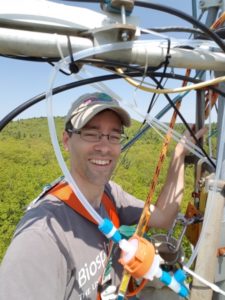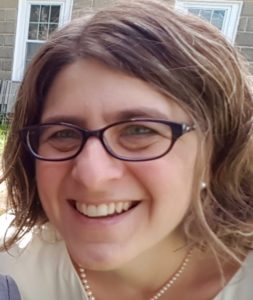Rick Wehr

Jessica Mondia

Hello! We are Drs. Jessica Mondia and Rick Wehr. We both have degrees in physics, but the science we do now combines physics, biology, and chemistry. Dr. Mondia works in biopharmaceuticals, which is about producing medicine from living cells to cure diseases such as cancer. Her job is to ensure that the food they feed the cells is not harmful to the patients and provides the best nutrients for the cells. Dr. Wehr studies how ecosystems like forests take in and give out gases like carbon dioxide, which affect the earth’s atmosphere. Funnily enough, we both use lasers a lot!
We’re excited by science because we like finding out how things work and why they are the way they are. We like figuring out the hidden workings behind what we see, hear, and feel. Dr. Wehr is particularly excited about his field because he wants to discover things that can help the environment. Dr. Mondia likes the fact that her work is helping people who are ill.
One thing we think is fascinating is that light is really a combination of electricity and magnetism, and that it sometimes behaves like a wave, and sometimes like a bunch of particles! Figuring that out allowed people to create many modern devices using x-rays, radio waves, microwaves, and lasers.
Did you know that by shining lasers through the air, you can tell what kinds of gas are in the air, and exactly how much of each kind there is? That’s because each kind of gas absorbs light of a different color. So if there’s a type of pollution that you’re concerned about, you can see if it’s in the air or not, and then by looking in different places, you can figure out where it’s coming from.
Another fascinating thing is that plants breathe in oxygen and breathe out carbon dioxide just like people do. They don’t have lungs, of course, but those gases go in and out of tiny holes in the plant. We usually think of plants doing the opposite, breathing in carbon dioxide and breathing out oxygen, and they do that too, when there’s sun. But when it’s dark, or if we’re talking about a part of the plant like the root, which is underground, then it’s breathing just like us.
Did you know that breathing is what allows us to get the energy out of our food? That’s what our bodies need the oxygen for: to generate energy by “burning” the food we’ve eaten. It’s just like a fire but without all the heat, thanks to special helper chemicals called enzymes, which our bodies make.
Some questions in our fields that you could investigate yourself are:
– Why does a ruler appear to bend when you put it in a bucket of water? Does the same thing happen in other liquids?
– What things affect the pitch of the sound from a vibrating guitar string?
– Why do car windows fog up in the winter, or bathroom windows when you shower?
– Does sunlight warm some kinds of objects more than others?
– What kinds of things make good (or bad) insulators (to keep something warm or cold)?
– What happens when you toss a ball straight up while you’re moving? What if you do it in a car? What if you do it on a roundabout at the playground?
– What makes a rainbow? Can you make your own rainbow with a spray bottle?
– Why do you see a rainbow on the surface of an old compact disc?